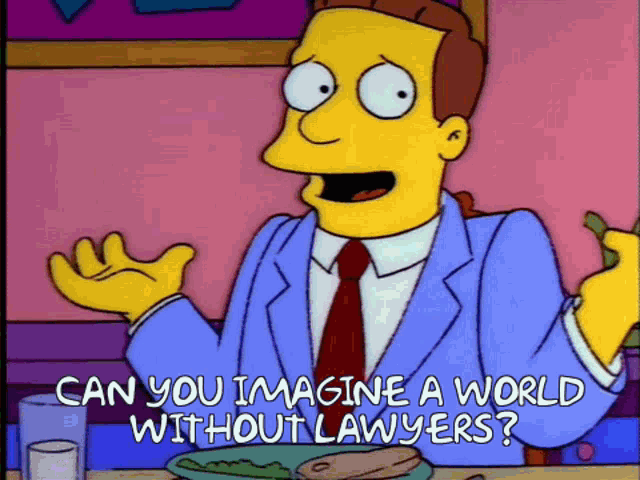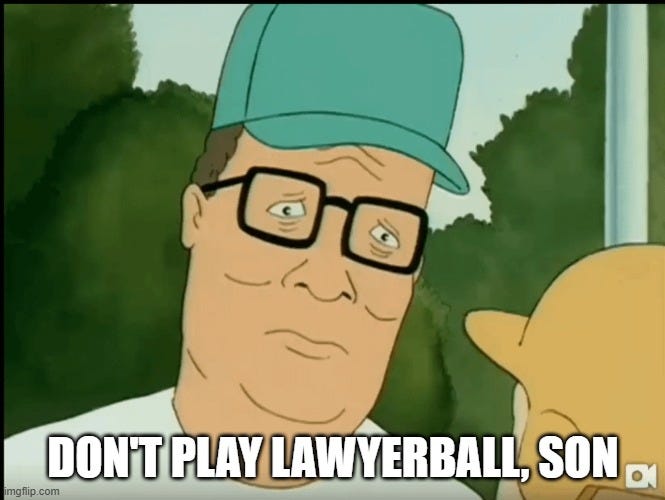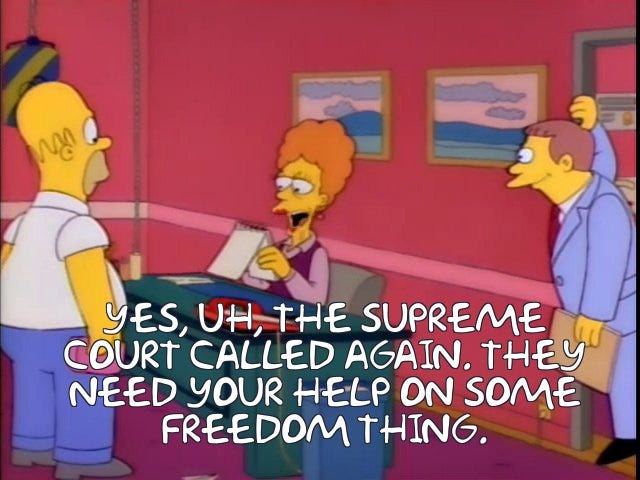The Hitchhiker's Guide To Prediction Markets Litigation
I read hundreds of pages of legal papers so you don’t have to

We’re quickly approaching the six-month anniversary of the first lawsuit on sports prediction markets. What began as a single salvo against Nevada has exploded into a multi-front legal battle, with new players joining the fray.
This week brings the first federal appellate argument on sports prediction markets. The only surefire bet — er, trade? — is that there’s much more litigation ahead.
This post is intended to provide a recap of everything that’s happening in the legal world of sports prediction markets. I’ve split this into three parts: (1) lawsuits involving state-gaming regulators, (2) lawsuits by Indian tribes, and (3) loss-recovery lawsuits by mystery LLCs.
And if you’re already up to speed and just want the new bits, here’s the TL;DR:
The Appeals (and Potential Supreme Court Review?): The Kalshi v. New Jersey appeal is being heard on September 10. Kalshi’s Maryland appeal may not be argued until late March, though it could also be late January or mid-February. It’s entirely possible that we’ll have a decision in the New Jersey appeal before the Maryland case even gets argued. And the timing could make things tricky for seeking Supreme Court review (for the side that loses first).
What’s Happening in Vegas…? Three’s company in Nevada; Crypto.com and Robinhood have also sued Nevada gaming regulators. Kalshi and Crypto.com are trying to avoid having Nevada dive into the evidence by arguing that their claims can be decided as pure questions of law. So far, the court doesn’t seem to be buying that argument — but it’s early days yet.
Tribes vs. Prediction Markets. Indian tribes in California and Wisconsin have sued Kalshi and Robinhood, asserting, among other things, that Kalshi’s contracts violate the Indian Gaming Regulatory Act and federal false-advertising laws. Things may come to a head sooner than expected in California, where the Tribes have asked the court to temporarily block Kalshi from operating on their lands while the lawsuit is pending. There are some gaps in the Tribes’ legal arguments that they may want to fill sooner rather than later, especially with the preliminary-injunction proceedings.
Loss Recovery Lawsuits. No, you don’t really need to know what the Statute of Anne is — at least, not yet. The “Gambling Recovery” lawsuits are slow moving, and they won’t be showing legal fireworks anytime soon. (At least, not until the next update.)
State lawsuits
Kalshi, Crypto.com, and Robinhood are locked in a legal battle with state gaming regulators, with Kalshi leading the charge. So far, Kalshi’s currently 2-1 in the states; it secured a preliminary injunction in Nevada and New Jersey, and it was denied an injunction in Maryland.
In an oversimplified nutshell, the legal issue is whether the Commodity Exchange Act, which gives the CFTC the authority to regulate “event contracts” traded on CFTC-supervised designated contract markets — including “contracts involving gaming” — leaves room for states to regulate those contracts where they function like “bets” or “wagers” that fall under state gaming laws.
The prediction markets say no, pointing to the Act’s “exclusive jurisdiction” provision. But that provision doesn’t expressly mention “event contracts.” Rather, it applies to “transactions involving swaps.” The prediction markets assert that event contracts are swaps, because they are “associated with a financial, commercial, or economic consequence.” They also argue that trying to comply with both the CFTC’s rules and state gaming regulations would be near impossible.
The states contend that the Commodity Exchange Act doesn’t clearly displace state authority, particularly with respect to gaming and gambling. They rely on the presumption against preemption — in plain English, the notion that, where Congress wants to kick out state regulators from an area traditionally regulated by the states, it’ll do so clearly. The states also argue that sports event contracts aren’t swaps because they aren’t “associated with a financial, commercial, or economic consequence,” and thus, the contracts don’t fall within the CFTC’s “exclusive jurisdiction.”
Now that you’re all caught up, let’s dive into the play-by-play.
New Jersey
Kalshi v. New Jersey
What’s Happening: Back in March, the New Jersey Division of Gaming Enforcement sent a cease-and-desist letter to Kalshi, claiming that Kalshi’s sports event contracts are unauthorized sports wagers under New Jersey law. Kalshi sued in New Jersey federal court and asked the court to temporarily block the state from enforcing its gaming laws while the lawsuit is ongoing.
Judge Kiel granted Kalshi’s request. That decision is now on appeal to the U.S. Court of Appeals for the Third Circuit; the appeal is set for argument on September 10.
Why You Should Care: This is the first federal appeal to grapple with sports prediction markets, and it’ll likely produce the first appellate opinion on the subject. The judges assigned to the case (Chief Judge Chagares, Judge Porter, Senior Judge Roth) were all appointed by Republican presidents, but I don’t think that matters here. Preemption isn’t really an issue with a strong ideological valence. Policy arguments will probably fall flat with this panel; instead, I expect that both sides will hone in on the text and structure of the Commodity Exchange Act. In other words, lawyerball.
Whatever the result, I suspect the Third Circuit won’t be the last stop for either New Jersey or Kalshi. The losing side might ask the US Supreme Court to step in.
But the timing gets tricky. One thing that the Supreme Court looks for in deciding whether to take up a case is a “circuit split,” or a conflict between two or more federal courts of appeals. Assuming that the Third Circuit’s decision is the first from a federal court of appeals, you’re not going to be able to show a split. And you have 90 days (up to 150, with extensions) from the date of the appellate judgment to file a petition for a writ of certiorari (aka “plz take up our case”).
For the loser of the New Jersey case, does that leave you with enough time to wait for the Maryland appeal, in the hope that the second appeal comes out your way (and creates a split)? Maybe.
Robinhood v. New Jersey
What’s Happening: More than three months after Kalshi secured its preliminary win in New Jersey, Robinhood sued New Jersey gaming officials and filed a motion for a preliminary injunction.
Why a lawsuit now? Back in March, Robinhood received a cease-and-desist letter nearly identical to the one Kalshi received. But unlike Kalshi, Robinhood voluntarily agreed to take down its sports prediction markets. After Judge Kiel issued a preliminary injunction in the Kalshi case, Robinhood went to New Jersey in May to ask for a temporary accommodation, under which it could offer sports events contracts to New Jersey residents while the Kalshi case was ongoing. New Jersey said no, so Robinhood sued.
Nothing’s happening in this case for a while: New Jersey agreed not to enforce its gaming laws against Robinhood until the Third Circuit issues its decision in the Kalshi case. (The parties also agreed to put the case on ice until then.)
Maryland
Kalshi v. Maryland
What’s Happening: In April, Maryland gaming officials sent Kalshi a cease-and-desist letter, asserting that Kalshi’s sports event contracts are unauthorized wagers on sporting events. Kalshi sued and asked for a preliminary injunction to block enforcement of Maryland’s gaming laws, raising the same preemption arguments that it made in similar lawsuits in New Jersey and Nevada.
But the federal judge overseeing the Maryland case, Judge Abelson, said no. Kalshi appealed, and Maryland voluntarily agreed to hold off on enforcement while the appeal is pending.
Why You Should Care: This case will most likely give us the second federal appellate opinion on sports prediction markets. I find the timing interesting; compared to the New Jersey appeal, this case is moving at a leisurely pace. Briefing won’t be done until the beginning of December – and probably later. (I suspect Maryland will ask for another extension.) If the current schedule holds, the case might get argued in late January 2026 (or maybe the special session in mid-February); if not, we’re probably looking at mid-to-late March 2026.
Why does the timing matter? Two reasons. First, there’s a decent possibility that, by the time the Maryland case gets argued, the opinion in the New Jersey appeal will already be out. The side that loses in the Third Circuit will have the added burden of having to argue against whatever the Third Circuit holds (and persuading the Fourth Circuit that its neighbor up north is wrong). That said, the Fourth Circuit won’t necessarily follow the Third lock-step.
Second, if the Maryland opinion comes after the New Jersey opinion (as expected), it could be the better vehicle for Supreme Court review, especially if the two courts disagree. It’s possible that the loser of the New Jersey appeal could still leverage the Maryland case as a reason for the Supreme Court to take up the case. But as explained above, the timing and developments would have to be just right.
(Side note: I keep saying it’s “likely” that the Third Circuit will come out with a decision before the Fourth — that may seem obvious because of the way the cases have been calendared. After all, New Jersey is being argued this week, while Maryland probably won’t be argued until the late winter or spring. But, absent a statutory deadline or some other critical emergency, federal judges will take as much time as they need/want to issue their opinion. Maybe the Third Circuit panel flip-flops during post-argument deliberations, while the Fourth Circuit is unanimously aligned right after the argument. The odds are quite low that Maryland leapfrogs New Jersey, but I wouldn’t entirely rule out the possibility.)
Nevada
Kalshi v. Nevada
What’s Happening: This lawsuit arises from the OG of prediction-market cease-and-desist letters. In early March, Nevada sent Kalshi a letter demanding that it take down its sports event contracts. Kalshi sued and asked for a preliminary injunction. Chief Judge Gordon granted Kalshi’s request. You’ve seen this movie in at least one other state (New Jersey).
What makes this case a little different from the other two Kalshi cases is that there’s no appeal. (Oh, and the Nevada Resort Association is an intervenor, but that’s neither here nor there.) Nevada could have appealed Judge Gordon’s preliminary injunction order to the Ninth Circuit. It chose not to do so. So, full steam ahead.
That doesn’t mean, however, that Kalshi’s not searching for a quick victory here. According to Kalshi, the legal issues in the case don’t require a whole lot of evidence to decide, so there’s no need for the parties to dig into “discovery,” which is fancy-lawyer-speak for when each side asks the other for evidence. In light of that, Kalshi filed an early summary judgment motion, and it asked the court to hold off on discovery.
Nevada doesn’t agree. It wants discovery on a range of topics, including: (1) whether Kalshi’s contracts are really distinguishable from sports bets, (2) whether Kalshi’s contracts create risk for Nevada consumers and sports integrity, and (3) whether geofencing is really cost prohibitive for Kalshi.
Here’s a live look at our geofencing providers:
Magistrate Judge Weksler, the judge responsible for handling some of the more day-to-day issues in the case, agrees with Nevada. She denied Kalshi’s request to stay discovery, noting that there are several issues for which the facts and evidence might matter. (For example, one issue is whether Kalshi’s contracts are swaps because they are “associated with a financial, commercial, or economic consequence.” Judge Weksler thinks Nevada should be able to test whether Kalshi’s contracts actually have “independent real-world consequences.”)
Judge Weksler doesn’t have the last word on the matter; Kalshi may “appeal” the decision by filing objections to Judge Gordon.
Why You Should Care: Unless Kalshi can successfully persuade Judge Gordon to flip Judge Weksler on the motion to stay discovery, the Nevada case will mark the first opportunity for a state to really go on offense in litigation. We’ll see if Kalshi’s legal arguments hold up with the benefit of a complete record — or if they require evidence at all.
(On preemption, I tend to think that Kalshi’s right — preemption is usually a question of law. But we’ve an emerging boondoggle over sports event contracts being “swaps,” and I do think that probably requires discovery. After all, you don’t litigate whether something is a security as a pure question of law.)
The Nevada case may also serve as a preview of fights in other jurisdictions. It wouldn’t surprise me to see disputes about the kinds of evidence that Nevada can obtain — and whether certain evidence is relevant to the parties’ legal arguments. Of course, what happens in Vegas may well stay in Vegas: the judges in the other prediction markets cases aren’t bound by the Nevada court’s decisions. They could decide discovery issues differently. But Nevada gives them a starting point, if and when those cases resume.
Crypto.com v. Nevada
What’s Happening: In June, Crypto.com followed Kalshi’s lead and sued Nevada gaming regulators. And, like Kalshi, Crypto.com moved for a preliminary injunction. Crypto.com also filed a motion for judgment on the pleadings, which is conceptually similar to the early summary judgment motion that Kalshi filed in its Nevada case. (Crypto.com likewise takes the position that its case “presents a straightforward pure legal question of federal preemption,” for which facts aren’t really necessary.)
Why You Should Care: I find it interesting that Crypto.com’s motion for a preliminary injunction has been fully briefed and pending for more than a month. By contrast, Kalshi got a preliminary injunction in very short order — Kalshi’s reply was filed April 7, a hearing was held on April 8, and an injunction issued on April 9. While I doubt that Judge Gordon is backtracking on his earlier ruling, it does make you wonder. Perhaps the judge feels as if there’s no real threat of enforcement at the moment, so he can take his time.
Robinhood v. Nevada
What’s Happening: Robinhood sued Nevada gaming officials in mid-August; it, too, sought a preliminary injunction. As in New Jersey, Robinhood approached the Nevada Gaming Control Board in May, asking if it could offer sports event contracts while Kalshi’s preliminary injunction remained in place. Nevada said no, so Robinhood sued. It’s early days yet for Robinhood in Nevada, so not much to see at the moment. (Again, I’d be interested to see how quickly Judge Gordon rules on Robinhood’s request for a preliminary injunction.)
Palate cleanser: What about the Supreme Court?
Before we switch gears to some of the other prediction markets cases, I’d like to spend a few moments on the Supreme Court. (After all, my day job is being an appellate lawyer, or so they tell me.)
A growing number of people (myself included) seem to believe that the preemption issue presented in Kalshi v. the States is headed to the Supreme Court. And there’s reason to think that the Supreme Court fight might happen sooner rather than later — after all, we’ve got federal appeals pending in New Jersey and Maryland. Moreover, it was New Jersey’s persistence in the face of long litigation odds that resulted in the invalidation of PASPA and the birth of the modern sports-betting regulatory framework. (Well, the framework for now.)
But nothing about the Supreme Court is certain. Sure, if the Third and Fourth Circuits disagree on preemption, the Court is more likely to take up the issue. It’s even more likely to do so if the Solicitor General of the United States (at the urging of the CFTC) files a brief in support of review.
On the other hand, I could see the Court not wanting to take up either New Jersey or Maryland — at least, not now. The decisions in both appeals arose out of preliminary proceedings in the cases. Nothing had been finally decided, and there had been virtually no fact development. The Supreme Court might want to wait for legal issues to be decided on a more complete record, or it may want other courts of appeals to chime in before stepping in. If that happens, and if Kalshi continues its win streak, it may be too late to put the sports-contract genie back in the bottle.
Tribal lawsuits
If you’re still with me, I’m sorry. But you’re two-thirds of the way there.
Let’s turn now to another interesting front: tribal litigation against Kalshi and Robinhood. There are two lawsuits — one in California, and one in Wisconsin. The plaintiffs in the California lawsuit are the Blue Lake Rancheria, the Chicken Ranch Rancheria of Me-Wuk Indians, and the Picayune Rancheria of the Chukchansi Indians. The plaintiff in the Wisconsin lawsuit is the Ho-Chunk Nation.
I haven’t really covered the tribal litigation in detail, so let me start by summarizing the Tribes’ arguments (as I understand them). The Indian Gaming Regulatory Act (“IGRA”) commits the regulation of gaming activities on “Indian lands” to Indian tribes. That includes Class III gaming — which, as practically everyone in the gaming industry knows, requires a tribal-state compact. IGRA defines “Class III gaming” as “all forms of gaming that are not Class I gaming or Class II gaming.” IGRA’s implementing regulations include sports betting as part of Class III gaming.
Now, how is that relevant to prediction markets? As part of their lawsuits, the Tribes have alleged violations of IGRA and the Lanham Act, the federal law on false advertising. Let’s break down both claims.
The IGRA claim
The Tribes’ IGRA theory is that Kalshi’s contracts violate the Commodity Exchange Act because they are “explicitly prohibited under 17 C.F.R. § 40.11(a)(1),” an Obama-era CFTC rule, and “the subject matter of [Kalshi’s] contracts constitutes gaming.” It seems like the Tribes’ argument is that, because the contracts violate Rule 40.11 and are therefore contrary to the public interest, they fall outside of the CFTC’s “exclusive jurisdiction,” which makes them fair game for regulation by the Tribes as Class III gaming.
It seems like this claim is designed to avoid the “exclusive jurisdiction” problem dogging the states in their prediction-markets fights. But the Tribes may just be trading one problem for another. If a designated contract market isn’t following the rules, isn’t it for the CFTC to address the issue? And the Tribes don’t really address the main question: is a sports event contract a “form of gaming” that’s subject to IGRA? The Tribes say yes, but they don’t really explain how — and the proposition’s not self-evident. We may see more on this subject in the weeks to come.
The Lanham Act claim
The Lanham Act is a federal law that covers false advertising and unfair competition. (It covers trademark infringement, too, but no need to get into that now.)
The Tribes say that Kalshi’s engaging in deceptive advertising. They focus on Kalshi’s past statements about how it’s the “first nationwide legal sports betting platform,” with “sports betting legal in all 50 states.” (Dustin keeps the receipts somewhere on this Substack.) The Tribes argue that they’ve been injured by Kalshi’s advertising because they’ve seen “lost sales and lost profits” from tribal gaming businesses.
The Lanham Act claims have challenging aspects. Assume that the Tribes are right that “sports event contracts” compete with sports wagers for consumer dollars. As far as I’m aware, none of the plaintiff Tribes offer sports wagering — California obviously doesn’t have sports wagering, and the Ho-Chunk Nation doesn’t offer it. So, I’m not sure whether the Tribes will be able to establish a commercial injury tied to Kalshi’s contracts, which the Lanham Act requires. True, the Act doesn’t require direct competition for there to be a commercial injury. But I don’t know whether the Tribes will be able to actually show that Kalshi’s representations caused them to lose gaming dollars.
What’s next
It seemed, for a while, that the Tribes might have time to work through the challenging aspects of their case. That’s no longer true, at least in California. Last week, the California Tribes filed a motion for a preliminary injunction, asking the federal judge overseeing the California case to temporarily block Kalshi’s operations on the Tribes’ lands while the case is ongoing, and to prevent Kalshi from stating that its contracts are “legal in all 50 states.”
As part of the preliminary-injunction proceedings, the court may provide us with an initial assessment on the strength of the Tribes’ claims. Barring any unexpected developments, we could have a ruling on the motion by mid-to-late October. (The hearing’s noticed for October 9.)
I should note two other things about the tribal lawsuits.
The preemption question in the state cases isn’t at issue in the tribal cases. IGRA is a federal law, so it won’t be preempted by the Commodity Exchange Act. That said, Kalshi and Robinhood will probably raise arguments that are thematically similar: Event contracts aren’t a “form of gaming,” even if some of those contracts “involve gaming,” and Congress plainly didn’t intend to subject designated contract markets to the dual jurisdiction of both the CFTC and the Tribes.
If the Tribes win on their IGRA claim, any relief will be limited to an injunction blocking Kalshi (and Robinhood) from offering sports event contracts on the Tribes’ lands. IGRA only allows a court to “enjoin a class III gaming activity located on Indian lands [that is] conducted in violation of any Tribal-State compact.” A win for the Tribes would test Kalshi’s contention that it can’t erect geofencing, but by no means will that victory mark the end of prediction markets as we know them. (On the other hand, a win might call into question just how “exclusive” the CFTC’s “exclusive jurisdiction” is.)
The ‘Gambling Recovery’ lawsuits
Remember the Statute of Anne? I don’t! Generically named “Gambling Recovery” LLCs have been filing loss recovery lawsuits under obscure 18th-century anti-gambling laws. And now, they’ve trained their sights on Kalshi, Robinhood, Webull, and Susquehanna, one of Kalshi’s major institutional market makers. To date, they’ve filed Kalshi-related lawsuits in Illinois, Massachusetts, and Ohio.
Like the states and the Tribes, the mystery LLCs take the view that the event contracts are little more than “illegal, unregulated wagers on the occurrence (or non-occurrence) of specific future events.”
There isn’t a whole lot going on in these cases. (There’s a fight over whether the Ohio case should be heard in federal or state court.) If you’re looking for fireworks in prediction markets litigation, look elsewhere for now.







